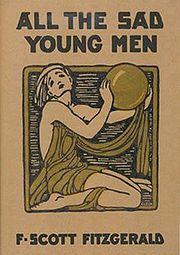
All the Sad Young Men
Encyclopedia

Short story
A short story is a work of fiction that is usually written in prose, often in narrative format. This format tends to be more pointed than longer works of fiction, such as novellas and novels. Short story definitions based on length differ somewhat, even among professional writers, in part because...
written by F. Scott Fitzgerald
F. Scott Fitzgerald
Francis Scott Key Fitzgerald was an American author of novels and short stories, whose works are the paradigm writings of the Jazz Age, a term he coined himself. He is widely regarded as one of the greatest American writers of the 20th century. Fitzgerald is considered a member of the "Lost...
, published by Scribners in February 1926.
Composition
Fitzgerald wrote the stories at a time of disillusionment. He was in financial difficulty, he believed his wife ZeldaZelda Fitzgerald
Zelda Sayre Fitzgerald , born Zelda Sayre in Montgomery, Alabama, was an American novelist and the wife of writer F. Scott Fitzgerald. She was an icon of the 1920s—dubbed by her husband "the first American Flapper"...
was romantically involved with another man, she had suffered a series of physical illnesses, and his play The Vegetable
The Vegetable, or From President to Postman
The Vegetable, or From President to Postman is a short story by F. Scott Fitzgerald that he developed into a play.-Plot:The main character, Jerry Frost is a low-level clerk. He is in an unhappy marriage and throughout the work he is striving for something more, yet he consistently falls short...
had been a failure.
Contents
The volume contains nine stories:- "The Rich BoyThe Rich BoyThe Rich Boy is a short story by American writer F. Scott Fitzgerald. It was included in his 1926 collection All the Sad Young Men.-Original publication:"The Rich Boy" originally appeared in two parts, in the January and February 1926 issues of Redbook....
" - "Winter DreamsWinter Dreams"Winter Dreams" is a short story by F. Scott Fitzgerald that first appeared in Metropolitan Magazine in December 1922, and was collected in All the Sad Young Men in 1926. It is considered one of Fitzgerald's finest stories and is frequently anthologized...
" - "The Baby PartyThe Baby PartyThe Baby Party is a short story published by F. Scott Fitzgerald in Hearst's International Cosmopolitan .-Plot:The story centers on a young couple, John and Edith Andros. They are young parents of Ede, their two and half year old daughter...
" - "Absolution"
- "Rags Martin-Jones and the Pr-nce of W-les"
- "The Adjuster"
- "Hot and Cold Blood"
- ""The Sensible Thing""
- "Gretchen's Forty Winks"
As with his other collections, its release was timed to follow the completion of his most recent novel, The Great Gatsby
The Great Gatsby
The Great Gatsby is a novel by the American author F. Scott Fitzgerald. First published in1925, it is set on Long Island's North Shore and in New York City from spring to autumn of 1922....
. Fitzgerald wrote "Absolution", one of the best-received stories in the collection, as a false start to Gatsby.
Reception
Upon publication—and somewhat belying the notion that Fitzgerald's most famous novel had not been enthusiastically received—the New York Times wrote, "The publication of this volume of short stories might easily have been an anti-climax after the perfection and success of 'The Great Gatsby' of last Spring. A novel so widely praised — by people whose recognition counts — is stiff competition. It is even something of a problem for a reviewer to find new and different words to properly grace the occasion. It must be said that the collection as a whole is not sustained to the high excellence of 'The Great Gatsby,' but it has stories of fine insight and finished craft."Ironically, in a letter nine months earlier, Fitzgerald had advised his editor Max Perkins
Maxwell Perkins
William Maxwell Evarts Perkins , was the editor for Ernest Hemingway, F. Scott Fitzgerald and Thomas Wolfe. He has been described as the most famous literary editor.-Career:...
against publicizing the book through the newspaper. "Rather not use advertising appropriation in Times—people who read Times Book Review won't be interested in me."
External links
- The New York Times Book Review in March, 1926, on All the Sad Young Men
- All the Sad Young Men, in wikilivres.info

